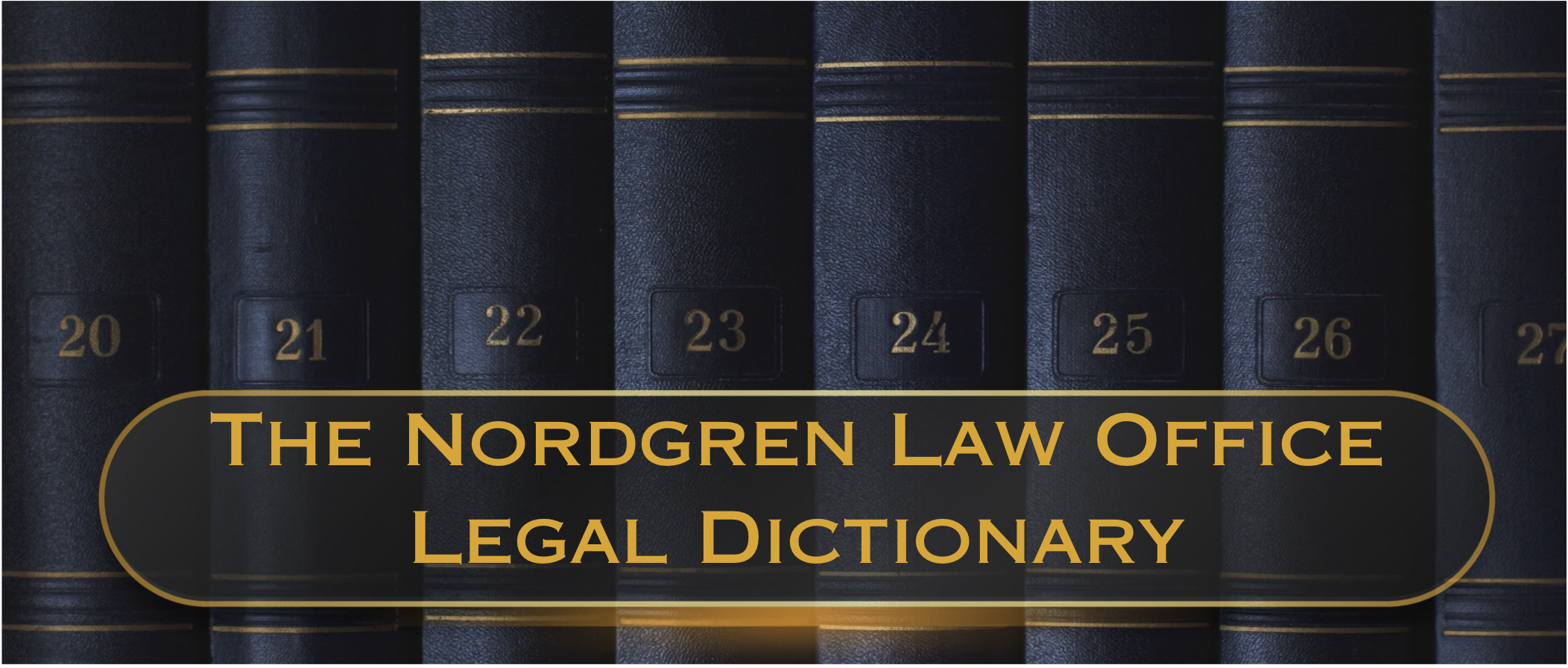What is Probate?
Probate is the process in which a living person divides the estate of a deceased person, called a “decedent”. When a person passes away, and the person had over $100,000 in personal property, or owns a home, their estate must go through the probate process. The probate process can look differently depending on whether the decedent had properly completed estate planning documents.
What is “Personal Property?” In the legal world, property is given different designations depending on what it is. “Personal property” is anything that a person owns that is not real estate, while “real property” is used specifically to discuss ownership of real estate or land. If the property is easily moveable like a car, or may not have a physical manifestation, such as a bank account or stocks, the property is considered “personal.”
What if the decedent did not own real property, and their personal property is less than $100,000?
Estates that contain less than $100,000 in personal property, and do not contain real property, Illinois Courts allow for a representative to use a Small Estate Affidavit. A Small Estate Affidavit is a legal document noting the property owned by the decedent, the heirs of the decedent, and what percentage of the property each heir is entitled to. Because the Small Estate Affidavit is usually used when the decedent is intestate, the property will go to each heir in percentages, following Per Stirpes distribution.
So what is the downside?
Small Estate Affidavits seem like an amazing tool, and they are when it comes to after someone has died. Small Estate Affidavits are overall more cost effective, and take less time than Probate, so what’s the catch?
Generally speaking, Small Estate affidavits are seen as less legally binding by banks and financial entities, and those trying to use a small estate affidavit have found it hard to get any information regarding the decedent’s accounts or records. This can be particularly burdensome when funeral fees and costs come due. Furthermore, popularity in Small Estate Affidavits seem to be trending downwards. Because financial institutions have been known to ignore or even harass loved ones using Small Estate Affidavits, many people that would otherwise qualify for them opt to proceed with probate to avoid needless complications.
In addition to financial entities discounting Small Estate Affidavits, if there is any dispute regarding who should be allowed to distribute the decedent’s property arise in court, the Small Estate Affidavit becomes useless.
What if the decedent had a will, and I am the named executor?
If you are a named executor in the will of a person that recently passed away, there are a few things that will need to happen before you are able to divide up the estate. Banks and other financial institutions require that executors submit Letters of Office before they grant access to accounts, stocks, and bonds.
How Can I get Letters of Office?
Letters of Office are a legal instrument, granted by a judge, that prove that a person has the authority to act on behalf of a decedent’s estate. If you are a named executor of a will, and are seeking Letters of Office, there are a few things that must occur before you can receive them.
1. File the Will
The first step in being granted Letters of Office starts by filing the Decedent’s will in the county that either they died in, or where their property is held. Each County is different in their process, but many will require the original will with the person’s signature. It is important to note that most counties in the state of Illinois, including Cook, will retain the will after it is filed. Counties will provide an option to buy a “certified copy” of the will, which is a printed scan of the will, with the seal of the county. In many cases, a certified copy of the will is not needed, so it is best to ensure that you make a copy of the will prior to filing it.
2. File a Petition for Probate of Will and for Letters of Administration
Once the will is filed, the next step in being granted Letters of Administration is to open up a probate estate for the decedent, which is done by filing a Petition for Probate of Will and for Letters of Administration. The standard form for Cook County can be located by searching for document “CCP 0315A.” For filers outside of Cook County, Petitions for Letters of Administration will be found sufficient when they include the following information as required by statute:
a. The name, place of residence of the person upon death.
b. The date and place of death.
c. The date of the will and whether you believe it to be the valid last will and testament of the deceased person.
d. The approximate value of the testators real and personal property.
e. Names and post office addresses of all heirs to the estate whether they are minors or disabled.
f. The name and post office address of the person named as the Executor.
g. The name and address of any fiduciary, unless supervised administration is requested.
Once you have completed this step, you must them file it with the clerk’s office. To do this, you can either go to the clerk’s office in person to file, or search online to see if the clerk’s office closest to you offers digital e-filing options.
3. Provide notice to heirs
After you have successfully filed your petition and received a court date, you should provide notice to the heirs of the will that there is legal action pending. Once you are appointed as the executor of the estate, you are bound by Illinois statute to provide notice to heirs by mailing such notice to the home addresses listed on the petition no later than 14 days after appointment. If you do not have a home address for the heirs, you must publish your appointment in a qualifying newspaper for three consecutive weeks. For residents in Chicago, one qualifying newspaper for publication of such notices is the Chicago Daily Law Bulletin.
What if the decedent did not have a will, and does not qualify for a Small Estate Affidavit?
For estates that do not qualify for a Small Estate Affidavit, and do not have a will (commonly referred to as “intestate estates”), the person seeking to be appointed as the Administrator (or “Petitioner”) will still need Letters of Office. The process for getting Letters of Office for an intestate is more time intensive, and the division of property is highly regulated by state statute.
How do I get Letters of Office?
To get Letters of Office for an intestate estate, Illinois requires a Petition for Letters of Administration, Affidavit of heirship, Oath and Bond, Declinations of Office, and notice to all heirs of the estate, or a waiver of notice signed by all heirs of the estate. Many find these requirements to be daunting, but with the right understanding, they can be handled easily.
1. Petition for Letters of Administration
Like with estates that have a will (referred to as “testate” estates), an intestate estate is opened by filing a petition. In Cook County, the Petition for Letters of Administration can be found by searching the document “CCP 0302A.” The Petition for Letters of office include all requirements of a Petition for Probate of will, with the additional requirement that the person filing the document prove a relationship between themselves and the deceased person. This can be as short as a statement such as “I am the child of X” or as long as a paragraph depending on the complexity of the relationship.
2. Affidavit of Heirship
The Affidavit of Heirship is required to show the familial lines of the deceased person, and who may be subject to receive property due to their death. Illinois follows Per Stirpes division of property. For more information on how Per Stirpes division works, see our article here.
There are no definitive requirements for an affidavit of heirship, but it is suggested that the affidavit include information regarding the decedent’s marriages, children, siblings (including half siblings and adopted siblings), parents, aunts and uncles, and cousins.
In addition to the suggested inclusions, Illinois requires that the Affidavit of Heirship be signed by the Petitioner before a notary public.
3. Oath and Bond
The Oath and Bond form operates as a form of insurance. For intestate estates, the Court requires that you show a form of insurance in the event that an issue arises during the administration of the estate, and the estate has insufficient funds to properly fulfill its duties. An example of when this would arise is if the deceased person had substantial credit card debt which exceeds the amount held by the estate. The Cook County Oath and Bond form can be found by searching “CCP 0312.”
To properly submit the Oath and Bond, it must include a bond 1.5x the size of the estate (an estate of $200,000 would then need a bond of $300,000), signed by the Petitioner before a notary public, and signed by a surety company.
4. Declination of Office
For estates that have more than one heir, Illinois requires the heirs not petitioning to administer the estate to specifically decline to administer the estate. The Cook County Declination of Office form can be found by searching “CCP 0309.”
5. Notice, or Waiver of Notice
In addition to Declinations of Office, estates with more than one heir are required to give sufficient notice to heirs of the estate. Illinois statute specifically requires that all heirs to the estate received a mailed copy of the Petition at least 30 days before the scheduled hearing on the Petition. At the hearing, Petitioners must provide proof that Notice was given at least 30 days before.
To avoid this 30 day delay, the Court also allows for Petitioners to file Waivers of Notice. Waivers of Notice are signed by the heirs specifically waiving their right to receive notice by mail. The Cook County Waiver of Notice form can be found by searching “CCP 0303.”
Issues that arise under the Intestate Probate Process
When estates do not contain wills, it is common for disputes between family members to arise. Questions as to who should administer the estate, and who should receive what can create lasting conflicts and animosity between family members. Families that have multiple people fighting to be named as the administrator can drag on for months, resulting in expensive court costs and attorney’s fees, and rarely result in a positive outcome. If you of a loved one currently do not have proper estate planning, please consider preparing estate planning documents in the future.






